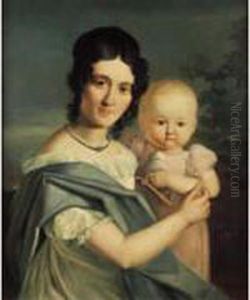Christian Karl Aug. Schieferdecker Paintings
Christian Karl August Schieferdecker was a German composer and organist born in 1679 in Teuchern, near Weißenfels, in the Duchy of Saxony-Weißenfels. His contributions to the Baroque music era, though not as widely recognized as those of his contemporaries, reflect the rich musical traditions of Germany during this period. Schieferdecker's work bridges the late Baroque style with early hints of the galant style that would dominate the mid-18th century.
Schieferdecker received his early musical education likely in his hometown or nearby regions, which were vibrant with musical activities and institutions. He then continued his studies in more prominent centers of music, which was a common practice for aspiring musicians of his time. In 1702, he succeeded Johann Theile as the organist at St. Mary's Church in Lübeck, a position of considerable prestige. This church was a central point for music in the city, especially known for its Abendmusiken, a series of evening concerts initiated by Franz Tunder and expanded by Dieterich Buxtehude, Schieferdecker's predecessor. Taking over from Buxtehude in itself was a significant achievement and testament to Schieferdecker's skills and reputation.
Throughout his career, Schieferdecker composed a variety of works, including cantatas, instrumental music, and operas. One of his notable contributions is the collection of musical compositions titled 'Musicalische Concerte,' which showcases his adeptness at blending vocal and instrumental textures. His style, while rooted in the traditions of the Baroque, also exhibits the clear, melodic lines characteristic of the emerging galant style, which favored expressive melodies over the complex polyphony of the late Baroque.
Schieferdecker's music, though not as widely performed today, offers valuable insights into the transitional period of early 18th-century German music. His compositions reflect the evolving tastes and styles of the era, bridging the gap between the richness of the Baroque and the clarity and elegance of the Classical period. Christian Karl August Schieferdecker died in 1732 in Lübeck, leaving behind a body of work that, while it may not have brought him the fame of some of his contemporaries, contributes to our understanding of the musical landscape of early 18th-century Germany.
